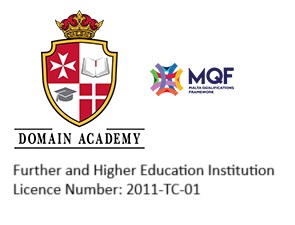Undergraduate Higher Diploma in Business Management
Undergraduate Higher Diploma in Business Management at Domain Academy Malta provides a broad, analytical and integrated approach for those who wish to study Business Management. It provides students with an opportunity to develop their understanding of theory and its application in a wide variety and diverse contexts.
Intake
March & October
EQF / MQF Level
Level 5
Mode of Delivery
Traditional
Duration of Course
2 Academic Years, 3-hours, Twice a Week (Full-Time and part-time options available)
Operational End Date
N/A
N/A
ECTS Credits
120 ECTS
Programme Qualifies for
Get Qualified Scheme
Certificate after completing
Student Success Rate
100
Intake
March & October
EQF / MQF Level
Level 5
Mode of Delivery
Traditional
Duration of Course
2 Academic Years, 3-hours, Twice a Week (Full-Time and part-time options available)
Operational End Date
N/A
N/A
ECTS Credits
120 ECTS
Programme Qualifies for
Get Qualified Scheme
Certificate after completing
Student Success Rate
100
Course Description
The programme is built around the imparting of knowledge and understanding of business organisations, their internal and external environments, their aspiration for developing a sustainable competitive advantage, and their recognition of opportunities in the marketplace. Students will have the opportunity to build skills and capabilities that will enable them to successfully compete in a wide range of fields critical to effective management.
Upon completion of this programme, you should have gained:
- Understand and have a wide knowledge of the broad range of areas which comprise business management.
- Critically understand the theory, models and approaches in the various areas of management, how these are applied in practice, and how they can improve the management process.
- Understand in depth the effects of environmental forces on decisions taken in organisations
- Describe the processes used when selecting the business and functional strategies in a variety of organisations.
- Understand the importance of adopting a proactive approach to organizational problems and challenges.
- Understand how to deal with uncertainty and complexity in diverse organizational contexts.
- Define what behaviours are expected during the execution of roles and functions by managers at different levels of an organization.
- Recognize the specific techniques required for an in-depth analysis of an organizational situation.
- Demonstrate a command of module-specific skills and a proficiency to employ sophisticated techniques for analyzing data.
- Demonstrate a confidence in taking leadership decisions in challenging business situations.
- Show proficiency in the use of communication techniques in order to accomplish organizational goals effectively.
- Apply the principles of evidence-based decision-making to determine innovative solutions to organizational problems in different functional areas.
- Select and employ analytical skills to translate creative ideas to operational solutions.
- Demonstrate a capacity for critical evaluation and to integrate theory and practice in a wide range of business situations.
This programme has exit award milestones along the path, and modules which can be taken indipendently as awards.
Target Group:
The course is an opportunity for different target groups:
-Individuals or young persons who are seeking a career in business management.
-Anyone who is already employed in administration or in the technical field and wishes to develop their career towards managerial and executive positions in business organisations, public sector organisations and NGOs.
-Individuals who operate their own enterprise and would like to develop their knowledge, skills and competences to remain competitive in their respective industry.
-Aspiring entrepreneurs who are seeking to open their own business organisation.
Target Audience:
- 16+
Course Language:
English
Where you will learn:
What you will study
How will you learn
How will you learn
This diploma is delivered with a flexible classroom-based method, through a variety of course materials, case studies, discussions, presentations, enquiry-based learning and problem-solving activities. We provide you with key reading and research activities, and you will make the most of our own teaching portal.
Where you will learn:
Lessons will be held in class in our premises at Domain Building, 102/104, Constitution Street, Mosta.
Assessment
Formative assessment
The goal of formative assessment is to monitor student learning to provide ongoing feedback that can be used by lecturers to improve their teaching and by students to improve their learning and development. More specifically, formative assessments throughout the modules will:
– help students identify their strengths and weaknesses and target areas that need improvement
– help lecturers recognise where students are struggling and address problems immediately
Summative assessment
Assessments will be designed according to the guidelines of each module specification. In general, the assessments will enable learners to demonstrate achievement of learning outcomes across the individual elements of the program. The range of assessments utilized will normally include essays, reports, presentations and other structured assignments.
Assessments are drafted in conjunction with the curriculum development department and tutor concerned. Final version is confirmed by the curriculum development department.
Assessments are moderated by tutor concerned, then also verified by the Internal Verifier.
The assessment will be based on assignment for each module. There may be one or two assignment for each module.
The assignment will consist of criteria related to each topic within the module with the respective outcomes.
Entry Requirement
- Matriculation Certificate equivalent to A’Level Standard of education; OR
- Relevant qualification at MQF/EQF Level 4 (preferably related to business and management)
In the case of learners whose first language is not English, then IELTS 6 (or equivalent) is required
In certain circumstances, learners with considerable work experience but no formal qualifications may be considered, subject to interview and being able to demonstrate their ability to cope with the demands of the course.
Fees & Funding
MFHEA Licence Nº: 2011 – TC – 01
Further and Higher Education Institution
Listen to what our past students had to say;
Domain Academy proudly collaborates with:



28 Years
of Excellence
8,000+
Satisfied Alumni
98%
Student Success Rate
250+
Active Students























